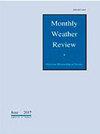Diagnostics for Imbalance on the Convective Scale
IF 2.8
3区 地球科学
Q3 METEOROLOGY & ATMOSPHERIC SCIENCES
引用次数: 0
Abstract
The analyses produced by a data assimilation system may be unbalanced, that is dynamically inconsistent with the forecasting model, leading to noisy forecasts and reduced skill. While there are effective procedures to reduce synoptic-scale imbalance, the situation on the convective scale is less clear because the flowon this scale is strongly divergent and non-hydrostatic. In this studywe compare three measures of imbalance relevant to convective-scale data assimilation: (i) surface pressure tendencies, (ii) vertical velocity variance in the vicinity of convective clouds, and (iii) departures from the vertical velocity prescribed by the weak temperature gradient (WTG) approximation. These are applied in a numerical weather prediction system, with three different data assimilation algorithms: 1. Latent Heat Nudging (LHN), 2. Local Ensemble Transform Kalman Filter (LETKF), and 3. LETKF in combination with incremental analysis updates (IAU). Results indicate that surface pressure tendency diagnoses a different type of imbalance than the vertical velocity variance and theWTG departure. The LETKF induces a spike in surface pressure tendencies, with a large-scale spatial pattern that is not clearly related to the precipitation pattern. This anomaly is notably reduced by the IAU. LHN does not generate a pronounced signal in the surface pressure, but produces the most imbalance in the other two measures. The imbalances measured by the partitioned vertical velocity variance andWTG departures are similar, and closely coupled to the convective precipitation. Between these two measures, the WTG departure has the advantage of being simpler and more economical to compute.对流尺度失衡诊断法
数据同化系统产生的分析结果可能是不平衡的,即在动态上与预报模式不一致,从而导致预报噪声大,预报技能降低。虽然有有效的程序来减少同步尺度的不平衡,但对流尺度的情况却不太清楚,因为该尺度上的气流具有很强的发散性和非静水性。在这项研究中,我们比较了与对流尺度数据同化有关的三种不平衡度量:(i) 表面气压趋势,(ii) 对流云附近的垂直速度方差,(iii) 偏离弱温度梯度(WTG)近似规定的垂直速度。这些数据应用于数值天气预报系统,采用三种不同的数据同化算法:1.潜热推移(LHN);2.本地集合变换卡尔曼滤波器(LETKF);3.结合增量卡尔曼滤波器的 LETKF。结合增量分析更新(IAU)的 LETKF。结果表明,表面压力趋势诊断出的失衡类型与垂直速度方差和 WTG 偏离不同。LETKF 引发了地表气压趋势的峰值,其大尺度空间模式与降水模式没有明显关系。这种异常在 IAU 中明显减弱。LHN 在地表气压中没有产生明显的信号,但在其他两个测量指标中却产生了最大的不平衡。用分区垂直速度方差和 WTG 偏离度测量的失衡情况类似,并且与对流降水密切相关。在这两种测量方法中,WTG 偏离具有计算更简单、更经济的优势。
本文章由计算机程序翻译,如有差异,请以英文原文为准。
求助全文
约1分钟内获得全文
求助全文
来源期刊

Monthly Weather Review
地学-气象与大气科学
CiteScore
6.40
自引率
12.50%
发文量
186
审稿时长
3-6 weeks
期刊介绍:
Monthly Weather Review (MWR) (ISSN: 0027-0644; eISSN: 1520-0493) publishes research relevant to the analysis and prediction of observed atmospheric circulations and physics, including technique development, data assimilation, model validation, and relevant case studies. This research includes numerical and data assimilation techniques that apply to the atmosphere and/or ocean environments. MWR also addresses phenomena having seasonal and subseasonal time scales.
文献相关原料
| 公司名称 | 产品信息 | 采购帮参考价格 |
|---|
 求助内容:
求助内容: 应助结果提醒方式:
应助结果提醒方式:


